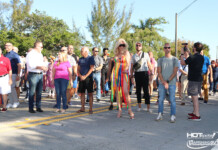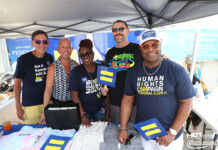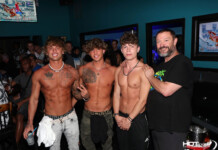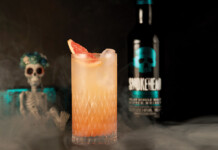On my way to Ford Field in downtown Detroit for the first night of Taylor Swift’s brilliant and breathtaking Eras Tour on June 9, I joked with my concert mate that he’d have to remember the show for me, even though that was my job. That is if, of course, he wasn’t about to literally lose his mind, too.
I’d read about the Taylor Swift “amnesia” phenomenon — Swifties reporting that the experience was so overwhelming they felt guilty they couldn’t remember more of it — and I wondered, would the pop magic, all 44 songs, go poof at 11:15 p.m. when Taylor popped off stage? Should I interview 20 Swifties about what happened just in case my mind went blank? What if they couldn’t remember all too well, either? Would we all wander around like Dorothy in Taylor’s Oz, Technicolor-dazed and too far from home?
This is how three hours and 20 minutes of Taylor Swift live in Detroit all started — my wild, out-of-body experience during what has been called “the tour of her generation.” Based on the light research I’d done before the show, I knew the first Detroit Eras Tour stop I attended would serve Big Taylor Energy with a stylish, over-the-top pageant feel that rivaled anything I’ve seen before (including decades of big pop spectacles from gay icons like Madonna, Cher, Janet and Mariah), so overwhelmingly massive and magical that I could barely take notes. I only took three, so that tells you a lot. But contrary to what I’d been warned about regarding Swift amnesia, my mind isn’t exactly the blank space I thought it might be. I actually remember so much! Most of my memories include, naturally, the queerest parts of the show.
I distinctly recall “Vigilante Shit,” performed during the final “Midnights” portion of the show, when the queer person next to me shouted something that was certainly on my mind and must’ve been on the mind of many other LGBTQ+ Swifties: “Happy Pride Month to me!” She was specifically referring to Swift and her incredible troupe of diverse dancers doing a burlesque-style chair dance on a tiered video pedestal stage. Some were women, but dancers Sam McWilliams and Kevin Scheitzbach, who were on either side of Swift in heels, exuded queerness in a way that made me appreciate the ambiguous expression of gender happening onstage during the show’s sexiest number, in front of a multigenerational crowd of nearly 60,000 people. If I were a little gay boy seeing that, I might be titillated, yes, but mostly I’d be like, “Mom, get me a sparkly one-piece right now.”
Though Swift’s Ford Field shows were just down the street from where Motor City Pride took place in Hart Plaza, she didn’t make any Pride-specific mention on Friday like she did in Chicago the week before at the beginning of Pride Month, when she essentially used her powerful platform to call out anti-queer legislators. Like her casting of Laith Ashley, the trans male model who played her lover in the video for “Lavender Haze,” Swift’s support of the LGBTQ+ community in Detroit was expressed entirely artistically. For instance, it was only four songs in when she sang her gay anthem “You Need to Calm Down,” which got her pro-queer message across loud and clear when a stadium full of fans shouted her “shade never made anybody less gay” zinger, a line Swift ensured stayed in the truncated live version.
Queer energy ran heavily through a lot of the “Midnights” section, actually. Sure, it began with “Lavender Haze,” which, naturally, has sparked conversations among her lesbian fans — lavender, after all, has historical roots as lesbian iconography. But after that song came “Bejeweled” and “Karma.” Seeing those bops come to life in the most exuberant live setting made both songs — the former about still shimmering in the face of ugliness, the latter a kitschy clapback — seem even more Taylor (er, tailor)-made for a drag stage near you. During “Karma,” Swift and her dancers had jackets on, their collective colors resembling a shiny rainbow. If you’re a boomer, you might imagine this kind of delightfully camp-level excess at a Cher show. And if Swift wanted to go one step further, she might consider producing the kind of all-access concert movie that captured Madonna during her 1990 Blond Ambition World Tour, which, alongside overt feminist themes (of which there are many during the Eras Tour), is fondly remembered for showcasing queer visibility.
So yes, I will remember a lot about the Eras Tour — Swift amnesia, be damned. I got a friendship bracelet from the person whose new Pride anthem is rightfully “Vigilante Shit,” an example of the surprising sense of community I felt at this show. I didn’t expect to get a bracelet, especially from someone else who’s queer, but it had me reflecting on being in this overwhelmingly joyous space after a couple of years of pandemic isolation.
It was 2020 when “Folklore” came out, and there was so little to look forward to. I have a feeling a lot of Swifties at that show might’ve felt like I did that year — scared, depressed, more hopeless than I’d ever been. I clung hard to those songs like they were magic, and then the magic was happening right in front of me. When I heard Swift’s spoken-word version of “Seven,” which opened the “Folklore” section of the show, it briefly took me back to that difficult stretch of isolation. Then I looked around, tens of thousands of light-up bracelets shining like distant stars all around me. The Eras Tour is special in that way — for a night, it brought us together to remember not just the night, but the journey we took to get there.
















